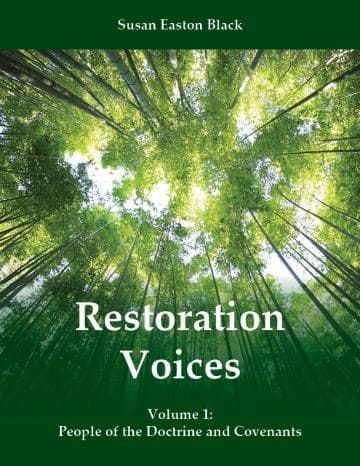Book
135 Chapters

1797–1881
D&C 124:138
On a journey to Canada with his brother Phineas Young in June 1830, Joseph wrote,
We stopped in the town of Lyons, at the house of a J. Green. Here I think we remained one night. It was at this place, I first had sight of the Book of Mormon. It was shown to us [by] a Solomon Chamberlain. Nothing could have been more acceptable to my famishing soul. I hailed it as my Spiritual Jubilee a deliverance from a long night of darkness and bondage.[1]
Joseph and Phineas continued their journey to Columbia, Pennsylvania. There, Joseph was baptized on April 6, 1832, by Daniel Bowen and ordained an elder a few days later by Ezra Landon. Enthused by his new religious faith, he traveled to New York and Upper Canada, sharing the message of the Restoration with friends and relatives. His brother John Young listened to his Restoration message and said, “Joseph, you have received a new doctrine, and another spirit from what you have had heretofore, and I fear it is a delusion; for the scriptures say that many false spirits have gone out into the world, and this is one of them.”[2]
As Joseph pondered his words,
My spirit sunk within me; and darkness profound gathered thick like a cloud, covering my mind and spirit so densely, that I was in great mental agony. However I did [not] remain long in this sad condition, for I prayed earnestly to the Lord for deliverance, and it came as suddenly as if I had been led from a dungeon, into the sunlight of heaven.[3]
As for his brother John, he suddenly had a severe pain in his head. He “threw himself on the hearth ... wrestling under excruceeding [sic] agonies.” He said, “Joseph, you profess to have the priesthood of an institution that heals the sick. If you have received such a gift as that, I wish you would lay your hands on me.” Joseph blessed him and later wrote, “My prayer was heard in a moment or two and he was perfectly healed.”[4] Within six months, Joseph baptized his brother John.
By 1832 Joseph had moved on to Kirtland. Two years later, while debating whether to join Zion’s Camp, the Prophet Joseph Smith promised him that if he joined the camp “not a hair of his head would be hurt.”[5] Of that march, Joseph wrote, “I never went through a more severe trial of my faith. It was as much as we all could bear. We walked one hundred miles in three days in the hottest weather.”[6]
In February 1835 the Prophet Joseph said to him, “Brother Joseph, the Lord has made you president of the Seventies.”[7] For the next forty-six years, Joseph Young presided as the senior president of the Seven Presidents of the Seventy.
One of his first actions as a president was to help the poor Saints move from Ohio to Missouri. At Haun’s Mill, Missouri, Joseph witnessed a massacre. He and his family fled from further atrocities to Quincy, Illinois. By 1840 they were residing in Commerce (later Nauvoo). On February 10, 1846, they departed from Nauvoo. Joseph’s wife penned,
We are leaving our homes today to cross the frozen river. We must not look back, but placing our faith in God, we must leave our destiny in His hands. Joseph appears to be cheerful, but the little children cry much of the time. They suffer with the cold, and the fires are cheerless.[8]
In 1850 Joseph and his family journeyed across the plains to the Salt Lake Valley. Living in the desert near the Great Salt Lake proved difficult for Joseph, who wrote,
We have had nothing to eat for three days. My brother Lorenzo sent us a small piece of venison tonight, which he had obtained from a trapper. We all relished it much. ... It may please God to send us bread again. We must not falter in our faith, but sing always to the Glory of God.[9]
Joseph was constantly looking for ways to strengthen the Saints. He traveled throughout the western states of Utah, Arizona, Idaho, and New Mexico, organizing Quorums of the Seventy. He also served in the Utah Territorial Legislature. By 1881 he had succumbed to general weakness and debility. Joseph died on July 16, 1881, at age eighty-four. His funeral was held in the Salt Lake Tabernacle.
[1] Joseph Young, “Autobiographical Sketch of Joseph Young,” comp. Merrill S. Lofthouse, 6. Church History Library.
[2] Young, “Autobiographical Sketch of Joseph Young,” 9.
[3] Young, “Autobiographical Sketch of Joseph Young,” 9–10.
[4] Young, “Autobiographical Sketch of Joseph Young,”10–12.
[5] James L. Bradley, Zion’s Camp 1834: Prelude to the Civil War (Logan, UT: James L Bradley, 1990), 26.
[6] Lucille Young Nelson, “Joseph Young,” 107. Church History Library.
[7] Smith, History of the Church, 2:181.
[8] Nelson, “Joseph Young,” 116.
[9] Nelson, “Joseph Young,” 118.
Book
135 Chapters
Items in the BMC Archive are made publicly available for non-commercial, private use. Inclusion within the BMC Archive does not imply endorsement. Items do not represent the official views of The Church of Jesus Christ of Latter-day Saints or of Book of Mormon Central.